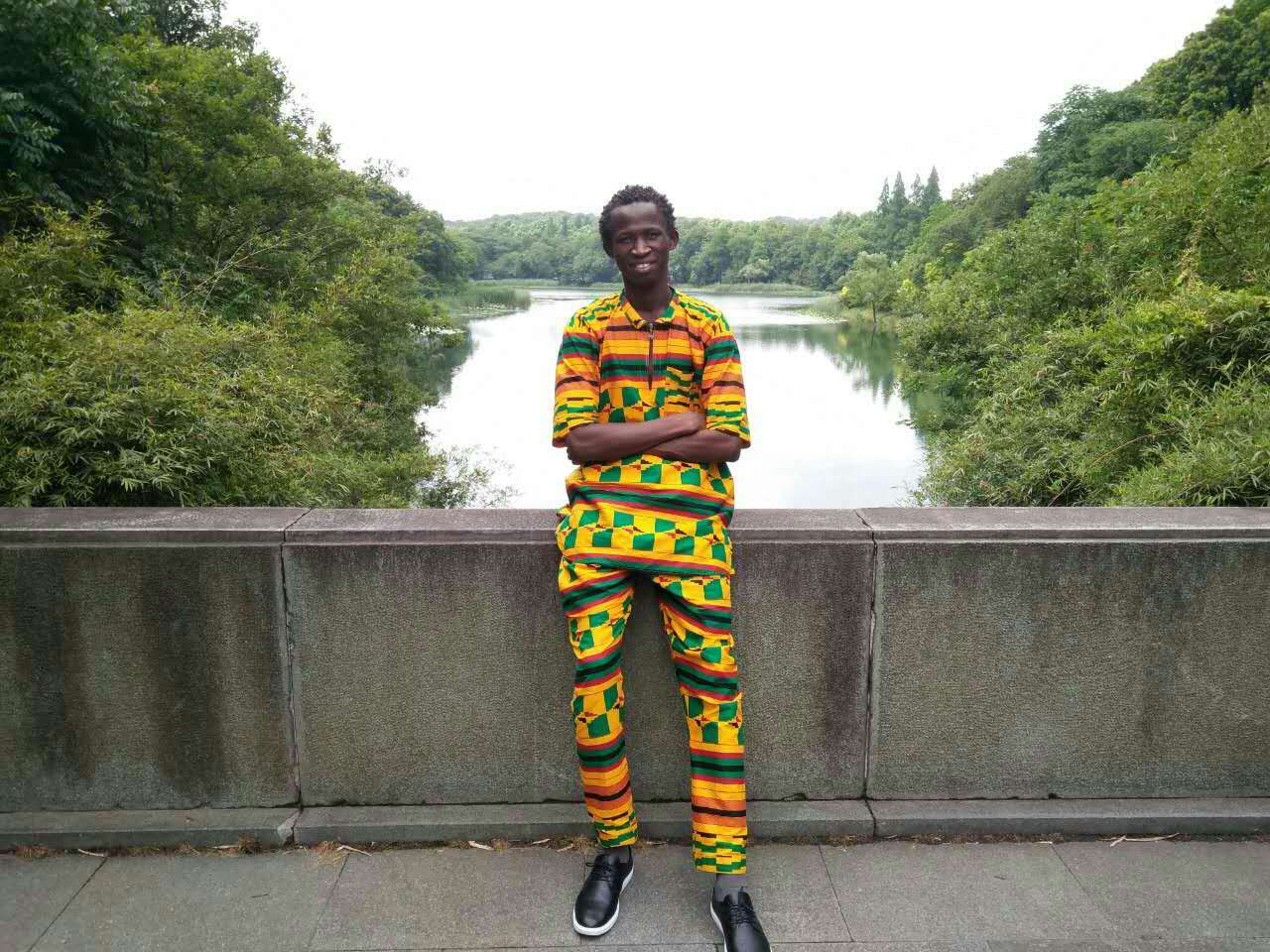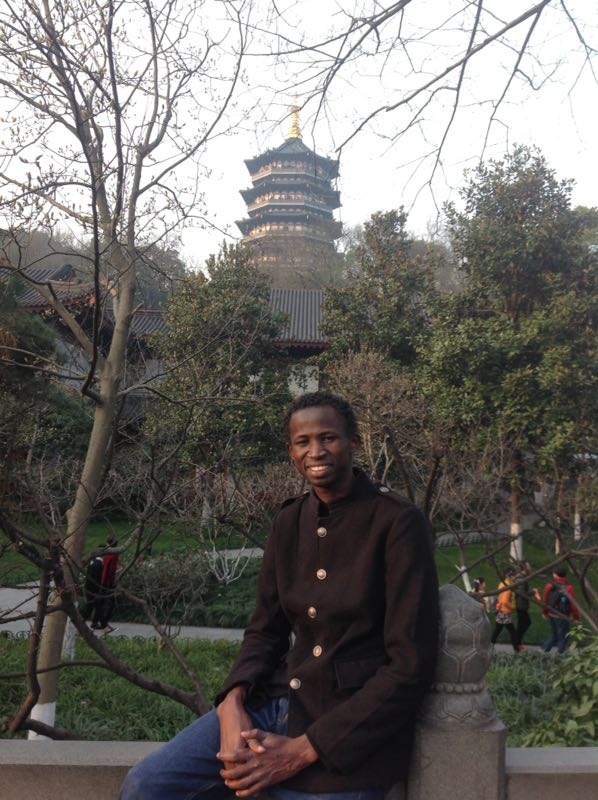32. A Time in Hangzhou. By Abdoulaye M’Begniga
I am Abdoulaye M’Begniga (本尼卡). I come from Mali. I am currently a PhD student at Anhui Normal University in Wuhu, Anhui Province. However, the little story I want to tell you concerns a period that I spent in one of China’s beautiful cities, Hangzhou, between 2016-2018.

On the road from Zhejiang university Xixi Campus to Zhijiang Campus
And my story begins…
As a matter of fact, I was very surprised not only by the beauty of the city of Hangzhou, but also by the degree of civility and hospitality of its inhabitants. Before being there, if someone had told me about it, I might not have believed it. But as the Chinese saying goes, “耳闻不如目睹,” which translates into English, “Seeing is believing.” I’m going to tell you an anecdote: I once visited Shanghai with a Pakistani friend. After our visit, I said to him, “In China, Shanghai is the only city that dazzled me a lot and it is Shanghai that I love the most.” I also said this sentence to the Chinese. But after being in Hangzhou, believe me, my mind has changed. The reason is simple: 真的下有杭州.
There is a famous Chinese proverb that says, “上有天堂,下有苏杭,” which translates to, “In heaven there is paradise, and on earth there are Suzhou and Hangzhou.” It is important, even necessary, to begin the narration of the story with this proverb. Almost every foreigner in China has heard this proverb once. This was also the case for me, in the sense that I had repeatedly heard the Chinese use this proverb. On the one hand, the use of the proverb displays a certain Chinese pride, and on the other hand, it encourages any foreigner to visit Hangzhou or Suzhou, even if only once. The first time I heard this proverb, I really wanted to go to Hangzhou and Suzhou. The great Chinese philosopher Lao Tzu said, “Choose the opportunity to act.”

With my classmates and professor
Thus, I seized without hesitation an opportunity to visit Suzhou offered by the College of International Education. Even though this little trip, organized by the College of International Education, only lasted a few days—3 days if I’m not mistaken—it was still interesting and fun in the sense that we visited a few sightseeing sites of Suzhou with delicious local dishes. After this trip, I got some idea of why the Chinese like to say “上有天堂,下有苏杭.” After Suzhou, I was just waiting for the opportunity to go see Hangzhou to satisfy the other half of the curiosity aroused by the famous proverb. “Who feeds on waiting risks starving to death.”
And in the endless wait for the opportunity to take a look at the wonderful city of Hangzhou, I did not want to starve from curiosity. “I must visit Hangzhou at all costs,” I kept telling myself. God doing things right, I finally got a great opportunity to see Hangzhou. In fact, after 5 years spent at Anhui Normal University for my bachelor’s degree, I had just been admitted to Zhejiang University for my Master’s, which was to take place over a period of 2 years. I was just very happy. All my Chinese friends to whom I announced the news said to me this sentence:“You will appreciate the city of Hangzhou very much.”

Sightseeing in Hangzhou
For me, the best way to corroborate what they said about Hangzhou was to be there. As a matter of fact, the first day I stepped onto the ground in Hangzhou, I could only mutter this sentence: “They were right.” In the taxi that took me to my destination, while chatting with the driver, I was envious of the scenery. Honestly, the short time I had to spend in Hangzhou was not in vain.
I enjoyed Hangzhou’s delicious food, like sweet and sour West Lake fish (西湖醋鱼), Longjing prawns (龙井虾仁), Aunt Song’s fish broth (宋嫂鱼羹), beggars’ chicken (叫花鸡), eight treasure tofu (八宝豆腐), stewed fish head and tofu casserole (砂锅鱼头豆腐), fish balls (鱼丸), stewed bamboo shoots (糟烩鞭笋), and osmanthus and chestnut soup (桂花栗子羹).

In the classroom at Zhijiang campus with my classmates
In addition to these delicious dishes, I also enjoyed the popular places in Hangzhou. And one of them is West Lake, in Chinese: 西湖. I never got tired of West Lake. I could go there several times, often alone and often with my friends. A friend of mine in Hangzhou used to write: “生活中只要有路,处处都是风景.” “As long as there is a road in life, there is scenery everywhere.” Borrowing her phrase to describe Hangzhou, I said: “只要想在杭州市里逛一逛,处处都是风景,” which means, “As long as you want to stroll around in Hangzhou, there is scenery everywhere.” Concluding with a sentence to describe Hangzhou, I will simply say: 下有杭州. On earth, there is Hangzhou.
About my country
Mali, in long form the Republic of Mali, is a state in West Africa, bordering Mauritania to the west, Algeria to the north-northeast, Niger to the east, Burkina Faso and Côte d’Ivoire to the south-southwest, Guinea to the southwest, and Senegal to the west-southwest. Mali is the eighth-largest country in Africa, with an area of over 1,240,000 km2. The population of Mali is 22 million. 67% of its population was estimated to be under the age of 25 in 2017. Its capital and largest city is Bamako. Former French colony of French Sudan, Mali became independent on September 22, 1960, after the break-up of the federation of Mali grouping Senegal and the Sudanese Republic. Its motto is “One People – One Goal – One Faith,” and its flag is made up of three vertical stripes of green, yellow and red.
To have your China story featured, click here.
Stories will be shared in English on our LinkedIn page, Instagram and Facebook page. Bilingual stories will be shared on our WeChat account mts_cn. Remember to like and share your favourite one!
